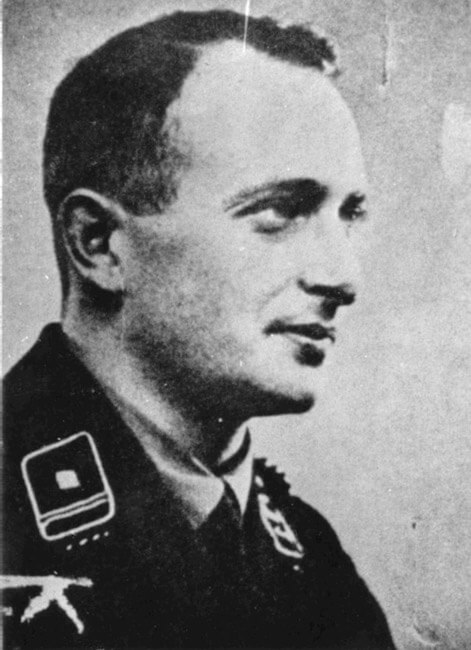
Adolf Eichmann (1906-1962) was a Nazi SS-Obersturmbannführer (a paramilitary Nazi Party rank corresponding with Lieutenant Colonel), and one of the central characters responsible for the mass deportation of Jews to ghettos and death camps in German-occupied territories during WWII.
In 1932 he joined the Nazi Party and the SS, with the rank of SS-Scharführer(Sergeant). He then joined the Sicherheitsdienst des Reichsführers-SS or SD,(the intelligence agency of the SS and the Nazi Party in Nazi Germany) and continued to work for this organisation when it was transferred to the authority of the Reichssicherheitshauptamt, or RSHA, (Reich Security Main Office) in 1939 as one of its seven departments. He was appointed head of the department responsible for forced emigration of Jews and other ‘undesirables’, which the Nazis ‘facilitated’ through violence, intimidation and economic pressure. After the outbreak of World War II he organised the first attempt at mass deportation of Jews from the ‘Greater German Reich.’ In 1941, he was appointed head of RSHA IV B4 (Jewish Affairs section, or Judenreferat), and in that capacity he played a central role in the deportation of over 1.5 million Jews from all corners of Europe to the extermination camps and mass murder sites in occupied Poland, and in occupied areas of the Soviet Union.
With the German invasion of the Soviet Union in 1941 Nazi policy towards the Jews became further radicalised as the emphasis changed from emigration to extermination. As chief of RHSA section IV B4, Eichmann participated in the Wannsee Conference in 1942, at which plans for the extermination of European Jewry were adopted and implemented. As Eichmann was to oversee the transportation of Jews to the death camps, RSHA chief Reinhard Heydrich tasked Eichmann to prepare a plan for the implementation of the ‘Final Solution to the Jewish Question’ to be presented the appropriate government and Nazi Party offices.
In 1942, Eichmann and his staff co-ordinated the deportation to the death camps of Jews from Slovakia, the Netherlands, France and Belgium. In 1943 and 1944, their attention turned to the Jews of Greece, Italy, and Hungary. Hungary was the only instance where Eichmann involved himself directly in the deportations. From the end of April 1944, to the beginning of July 1944, Eichmann and his attendants deported approximately 444,000 Hungarian Jews to Auschwitz-Birkenau, where the majority were gassed.
At the end of the war Eichmann was caught by the Americans, but he managed to escape in 1946 and fled to Argentina. There he lived under a number of false identities. In 1960 agents of the Mossad (Israeli Security Service), abducted him and brought him to Israel to stand trial. In December 1961, Eichmann was found guilty of war crimes against the Jewish people. He was hanged on 31 May 1962, the only person ever to have received the death penalty by an Israeli court.
